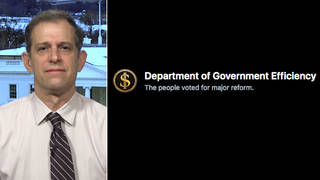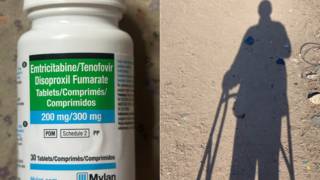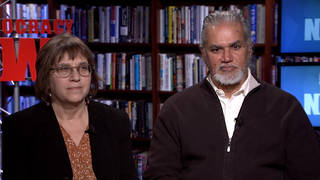
Related
Topics
Guests
- Imara Joneseconomic justice contributor for Colorlines.com. He served in the Clinton White House, where he worked on international trade policy.
- Trudy Liebermancontributing editor to the Columbia Journalism Review. She blogs on healthcare at cjr.org.
Links
- “Five threads reporters missed on Obamacare.” By Trudy Lieberman (CJR)
- “What Obamacare Means For You.” By Imara Jones (Colorlines)
- “Shutdown Day 1: Costs Already High.” By Imara Jones (Colorlines)
- "Exchange Watch: Telling half a story about the federal exchanges.” By Trudy Lieberman (CJR)
- Follow Trudy Lieberman on Twitter: @Trudy_Lieberman
- Follow Imara Jones on Twitter: @imarajones
The federal government shutdown began on Tuesday, the same day that a key facet of President Obama’s healthcare law went live nationwide. For the first time, Americans were able to begin purchasing health insurance from federal and state exchanges. But The New York Times reports the new healthcare law will leave out two-thirds of the nation’s poor blacks and single mothers and more than half of the nation’s low-wage workers who do not have insurance. That’s because they live in 26 states controlled by Republicans that have rejected the vast expansion of Medicaid. The U.S. Supreme Court allowed states to opt out of the expanded Medicaid provision earlier this year. Overall, up to seven million Americans are now ineligible for Medicaid — they make too much to qualify for Medicaid, but not enough to get help to buy a plan on the new healthcare market. We discuss the government shutdown and the launching of health insurance enrollment under the Affordable Care Act with two guests: Imara Jones, economic justice contributor for Colorlines.com and a former Clinton White House staffer, and Trudy Lieberman, a contributing editor to the Columbia Journalism Review who has reported extensively on the Affordable Care Act.
Transcript
AMY GOODMAN: And then, you couple this with the healthcare exchanges—who gets covered, and who doesn’t? The front page of The New York Times today, major piece, “Millions of Poor are Left Uncovered by Health Law: Choice by States Not to Expand Medicaid Undercuts Reach of Obama Plan.”
IMARA JONES: I mean, one of the interesting things is that the GOP is saying that this is about “Obamacare” and want to shut down the government because of “Obamacare,” but the GOP largely has defeated “Obamacare” in a lot of places in the country. And that’s because, as the Times point out, as I’ve written about, as you just said, that half—
AMY GOODMAN: You’ve written about it well before this.
IMARA JONES: I did, I did. That half of the states are—in the United States, are participating in Medicaid. Overwhelmingly, they’re in the South, where half of people of color live in this country, black people, and also Latinos. The second-largest state in the union that—with a Latino population is Texas. It’s not included. And so, it’s leaving a lot of people behind. And so, they say that they want to roll back “Obamacare,” but through stopping Medicaid, they largely already have.
AMY GOODMAN: I mean, it really is astounding. “The 26 states that have rejected the Medicaid expansion are home to about half of the country’s population,” writes The New York Times, “but about 68 percent of poor, uninsured blacks and single mothers. About 60 percent of the country’s uninsured working poor are in those states. Among those excluded are about 435,000 cashiers, 341,000 cooks and 253,000 nurses’ aides.” Trudy Lieberman, you’ve also written extensively about the whole—not only the Affordable Care Act, but just who gets covered and who doesn’t, because you have to include those who are going to be cut off of Medicaid expansion—
TRUDY LIEBERMAN: Right.
AMY GOODMAN: —when they don’t get Medicaid expansion in their state.
TRUDY LIEBERMAN: Right. The irony right now is that the poorest of the poor are going to be left out of this expansion of healthcare. And it’s—as the Times points out, it’s affecting a whole lot of people at the very, very bottom of our income and our work spectrum. And these are the people who are—usually have incomes below the federal poverty level. They have very erratic work histories, work jobs and so forth, and they really have no options for getting health insurance. And the “Obamacare,” the Affordable Care Act, had contemplated that they would be part of this Medicaid expansion. So when the 26 states decided not to expand, there were provisions for people between 100 and 138 percent of poverty—arguably, they have low incomes, too—but ironically, the people below 100 percent are not going to get help. And they have no money to buy expensive health insurance. And in most of those states, I think it’s worth noting that the Medicaid programs that do exist do not offer benefits to childless adults. And that is especially true in places where they have huge numbers of people in these populations.
AMY GOODMAN: And when does the—the states that have decided against Medicaid expansion, when will people be affected?
TRUDY LIEBERMAN: They’re actually already being affected, because they’re effectively now not under the insurance tent, and they have probably never been. And so, on January 1st, it was contemplated, before the Supreme Court ruling last year, that they would be brought under it. And they’re not going to be.
AMY GOODMAN: Imara Jones, you were in the Clinton administration when a previous shutdown happened. In New York, I remember the famous image of the New York Post of Newt Gingrich, you know, as a baby having a tantrum, because he was very upset that he was put at the back of the Clinton plane. And, of course, in the end, they were forced to back off, the Republicans.
IMARA JONES: That’s right. That was actually my very first job, and I had probably been there, I don’t know, a couple of weeks. And one of the most interesting things is the degree to which it is incredibly disruptive. It takes maybe—fromt the shutdown that lasted three weeks, it took maybe eight or nine months for the federal government to sort of really pull itself together and to stand itself back up after a three-week shutdown. And this is more dramatic, because at that time half of the government was shut down because they passed half of the appropriations bills; this is now the entire government.
And who knows what collateral damage we are causing by shutting down the government? For example, the Centers for Disease Control is in the midst of their flu vaccination campaign to vaccinate millions of the most vulnerable to prevent the spread of the flu. Well, one of the interesting things is that because of the government shutdown, that program has now been halted, and as a result, there’s a distinct possibility that the longer this goes on, that we won’t have vaccinated millions for the flu and may be setting ourselves up for a flu epidemic. And that’s just one. That’s just one of the most obvious. And there are countless examples of that.
AMY GOODMAN: We’re going to break and then come back to this discussion. Our guests are Imara Jones of ColorLines.com and Trudy Lieberman of the Columbia Journalism Review. We’re talking Affordable Care Act. We’re talking about who gets insurance, who doesn’t. And we’re talking government shutdown. Stay with us.
[break]
AMY GOODMAN: This is Democracy Now!, democracynow.org, The War and Peace Report. I’m Amy Goodman. On Monday, correspondents with the show Jimmy Kimmel Live asked unsuspecting pedestrians in Los Angeles if they prefer the Affordable Care Act or “Obamacare.” Of course, those are two different names for the same plan. As it turns out, most people interviewed didn’t seem to realize this.
CORRESPONDENT: So the Affordable Care Act is more affordable than “Obamacare”?
UNIDENTIFIED MAN 1: Just the name says it all.
CORRESPONDENT: Right.
You would agree with the Affordable Care Act?
UNIDENTIFIED MAN 2: Absolutely. You know, I think it’s nice that everyone can afford it, and everyone should be able to afford it. But to force people to pay something and then doctors to make something, limiting their ability to do their job, that’s kind of anti-American.
CORRESPONDENT: Right, so “Obamacare” is un-American?
UNIDENTIFIED MAN 2: I think it’s kind of un-American to force people. What if they can’t afford it? What if they want more coverage?
CORRESPONDENT: And the Affordable—and the Affordable Care Act is American?
UNIDENTIFIED MAN 2: I think it’s more American, because it allows people to make their own choices on what they want and who they want to work with.
CORRESPONDENT: Do you agree with the Affordable Care Act or “Obamacare”?
UNIDENTIFIED WOMAN: The Affordable.
CORRESPONDENT: And why do you prefer the Affordable Care Act over “Obamacare”?
UNIDENTIFIED WOMAN: I just don’t agree with the whole “Obamacare” policy thing that’s going on. I just don’t agree with it.
AMY GOODMAN: That was from Jimmy Kimmel. Imara Jones is our guest, ColorLines.com, and Trudy Lieberman of Columbia Journalism Review. Trudy, can you respond?
TRUDY LIEBERMAN: Yeah. The Republicans began to use the word “Obamacare.” Remember, we had “Hillarycare” and “Romneycare,” and it became an epithet. And I think they were hoping to demonize the law by the term. And apparently they did. According to the Kimmel interviews, people seem to prefer the more neutral term, Affordable Care Act, and they liked the name “affordable,” thinking that the law is going to make health insurance more affordable for them.
AMY GOODMAN: Talk about the appointed navigators, how they help potential policy owners untangle some of the intricacies.
TRUDY LIEBERMAN: Well, we really don’t know exactly yet how all this is going to play out. The navigators have just recently been trained. It’s a very, very complicated process, I think, to buy a good insurance policy. It is whether we have buying it in the exchange or buying it outside the exchange, because it involves a lot of thinking about your risks and how much you’re willing to tolerate and what you think your needs are going to be the next year. And when it comes to healthcare, you really don’t know what your needs are going to be next year unless you have a chronic illness, because unforeseen things happen. And so, that’s very difficult. So the navigators, theoretically, are supposed to be stationed at various places around the country.
AMY GOODMAN: In some states, they don’t—they purposely, like in Florida, don’t let you know where—who these navigators are, the people who are supposed to help you.
TRUDY LIEBERMAN: Right, in Florida, they’re not allowed to sell, for—or sign people up, for example, on—at county health departments. And that’s where a lot of people—would be a logical place for them to sign up. And so, you see a lot of navigators, and in some states, there are not going to be enough money for navigators, and in some areas of a state, there may not be very many navigators, if any at all.
But, in general, they should be able to help people walk through that process: sit down with them at the computer; understand what their income is, how it’s likely to change during the year, if it’s going to change; think about the kinds of policies that they need; think about the kind of premium that will fit in their budget. And I think that based on what I’ve heard just from the two days of the sign-up, a lot of people are going for the cheapest premium they can find. And that’s not necessarily a good way to buy insurance. We all know insurance is very expensive, and it’s going to keep getting expensive. I don’t see that that’s going to change a lot in the near future. So, people—
AMY GOODMAN: Can the push for repeal affect anything retroactively?
TRUDY LIEBERMAN: I think it’s going to be depending on how the law is written. I suppose they can say that it’s never going to happen, but I think that’s probably not likely to happen. I think the law is going to go ahead.
AMY GOODMAN: What were you most surprised by in your research?
TRUDY LIEBERMAN: How little the American people know about what American healthcare is all about. It’s absolutely astonishing to me that they have so little information about what kind of system we have, how it works, why it is so expensive. I think most people do not understand the root causes of the high cost of health insurance in this country. And it’s not necessarily the insurance companies. It’s the medical establishment that sets the price, pretty much. And insurance companies are basically a pass-through. You can argue whether they need to be there or whether they should have such high administrative costs, but I think people don’t realize that it’s the hospitals and the doctors and the whole medical establishment right now that is really the root of our healthcare inflation.
AMY GOODMAN: Is it possible that this could lead to single-payer?
TRUDY LIEBERMAN: I think it could go either way. I think that if this law does not work—and we don’t know yet what’s going to happen; it’s going to probably take two years or longer for a shakeout to occur—and it doesn’t work, I think there will be cries for a national health service.
AMY GOODMAN: Imara Jones, your take on this? I mean, the idea that you were talking about millions of poor left out now, the entire South, I mean, 26 states opting out of Medicaid expansion, the poorest, millions and millions of people not now having any insurance—could this be the path to single-payer?
IMARA JONES: Perhaps. I think the only way that that would happen is if the law is successful, because, I mean, it also—it has to be noted that at the same time it leaves millions of poor behind, it is the single largest expansion of healthcare in 50 years. So, it’s a paradox, which is an interesting place to be. If it is successful in the other states that did not expand Medicaid, in terms of bringing down cost, in terms of helping states get healthcare costs under control—because one of the most important things about the law is that it actually turns healthcare into a functioning marketplace through price transparency. You can actually make judgments about how much things cost by comparing them across states. So, if it’s successful in terms of bringing down costs, I think there will be pressure on GOP governors in the South to adopt and to expand it. But I think that that’s the only way.
Right now the problem is that this is—this is about politics, it’s not about policy, because if it was about politics and the federal government is going to pay for 100 percent expansion in healthcare of the working poor in your state, they would do that. The reason why they’re not doing it is because of politics.
AMY GOODMAN: Let’s talk about the debt ceiling, how this fits into this picture, Imara Jones.
IMARA JONES: It—
AMY GOODMAN: And explain what it is, what the debate is, and how this is converging with that deadline.
IMARA JONES: Right. So, on October 17th, the United States hits its debt ceiling, which is a legal limit passed by Congress for how much the country can borrow. It allows the United States to go on the open market and to borrow money in order to pay its costs. The number of the debt right now is $16 trillion. It sounds a lot. It freaks people out, but this is a big country with big responsibilities. The important thing about debt is not how big it is, but your ability to pay for it, and the United States can pay for a big debt. We’ve got the world’s largest economy, and we’ve got the reserve currency. We can do that.
If Congress does not raise the debt ceiling, what will happen is that the United States will—United States Treasury will run out of money. They say they’ve only got $30 billion in the bank. If that happens, interest rates are going to go up dramatically for homeowners, for student loans, for credit cards. Because the United States is the global reserve currency and many things are dollar-denominated, it will touch off a global economic crisis, because it’s going to totally revalue the dollar. The effects are on and on and on. And that’s just two weeks away.
And so, we have a weak economy that’s been made weaker by sequestration of 750,000 jobs lost this year, now on top of a government shutdown which is taking millions of paychecks and pushing millions of Americans to the edge. And then, on top of that, just two weeks from now, we’re on the verge of a global economic crisis caused by this. And it’s—I think there’s a strong likelihood that will happen, because it’s important for people to realize that for the tea party this is about principle, not politics, and they believe that whatever means are necessary to turn back a government that they think is out of control is what they’re going to do.
AMY GOODMAN: But they’re in the minority, even of the Republican Party in Congress.
IMARA JONES: That’s right, but the problem is that they have the money. This is the—this is the thing, that they’re sitting on the funding source for the Republican Party, and that’s what puts them in the driver’s seat.
AMY GOODMAN: John Boehner could stop this at any point, and he’d have majority support.
IMARA JONES: John Boehner almost lost his job due to them last year. He only held onto the speakership, I believe, by six votes. There are 30—up to 80 of them. If just 20 of them decide to not support him, he could have a leadership challenge and be deposed. That’s what he’s worried about.
AMY GOODMAN: Wasn’t he outgoing anyway now?
IMARA JONES: He may be, but I think that’s—it’s not a—it’s not for certain. If he were certain that he was going to go out, then it would seem to me that he would wish to be a statesman and to do things differently. But that’s not where we are.
AMY GOODMAN: Massachusetts Senator Elizabeth Warren was speaking on Monday just before the government partially shut down.
SEN. ELIZABETH WARREN: With millions of people out of work, with an economic recovery still far too fragile, with students and families being crushed by student loan debt, with millions of seniors denied their chance at one hot meal a day with Meals on Wheels, and millions of little children pushed out of Head Start because of a sequester, with the country hours away from a government shutdown and days away from a potential default on the nation’s debt, the Republicans have decided that the single most important issue facing our nation is to change the law so that employers can deny women access to birth control coverage. In fact, letting employers decide whether women can get birth control covered on their insurance plans is so important that the Republicans are willing to shutter the government and potentially tank the economy—over whether women can get access to birth control in the year 2013, not the year 1913, the year 2013. I have a daughter, and I have granddaughters, and I will never vote to let a group of backward-looking ideologues cut women’s access to birth control. We have lived in that world, and we are not going back—not ever.
AMY GOODMAN: That was Senator Elizabeth Warren right before the government shutdown. Final comment, Trudy Lieberman?
TRUDY LIEBERMAN: She did mention Meals on Wheels, and that is—that program has been affected also by the sequestration, and there are elders waiting in line for food. And we didn’t talk about that, but that’s just as important as some of the other things that will be cut.
And as far as the Affordable Care Act, I think it’s going to be a very interesting—in the six months, for sure, during the open enrollment period and into the next couple of years.
AMY GOODMAN: And Imara Jones? By the way, do you think any of these websites have been hacked? I mean, New York, I think, didn’t even go online the first day.
IMARA JONES: I saw a report in the Times, I believe, or maybe it was the Post, that said that there had been no evidence of hacking, that it was a lack of capacity on the part of the sites.
But I think that we’re in a really frightening space. One of the things that we have to be really careful about is to not be alarmist. But I think that if you are not necessarily concerned about where we are, then one should be. And it’s really important to realize that within a matter of weeks we really could be back in a situation of where we were in 2008, and the only way that that changes is if people make their voice heard and demand that Washington change and put the government back on the side of the people and not on the side of this 30—group of 30 that wishes to undo what they would deem to be a socialist government.
AMY GOODMAN: We’ll leave it there, Imara Jones of ColorLines.com and Trudy Lieberman of the Columbia Journalism Review.
This is Democracy Now! When we come back, well, we’re coming up on the 12th anniversary of the war in Afghanistan. This was America’s longest war. We’re going to speak with a woman who was an Afghan parliamentarian, now lives underground in Afghanistan. And for all of our transcripts, the podcasts, video and audio podcasts, you can go to our website at democracynow.org. Be back in a minute.












Media Options